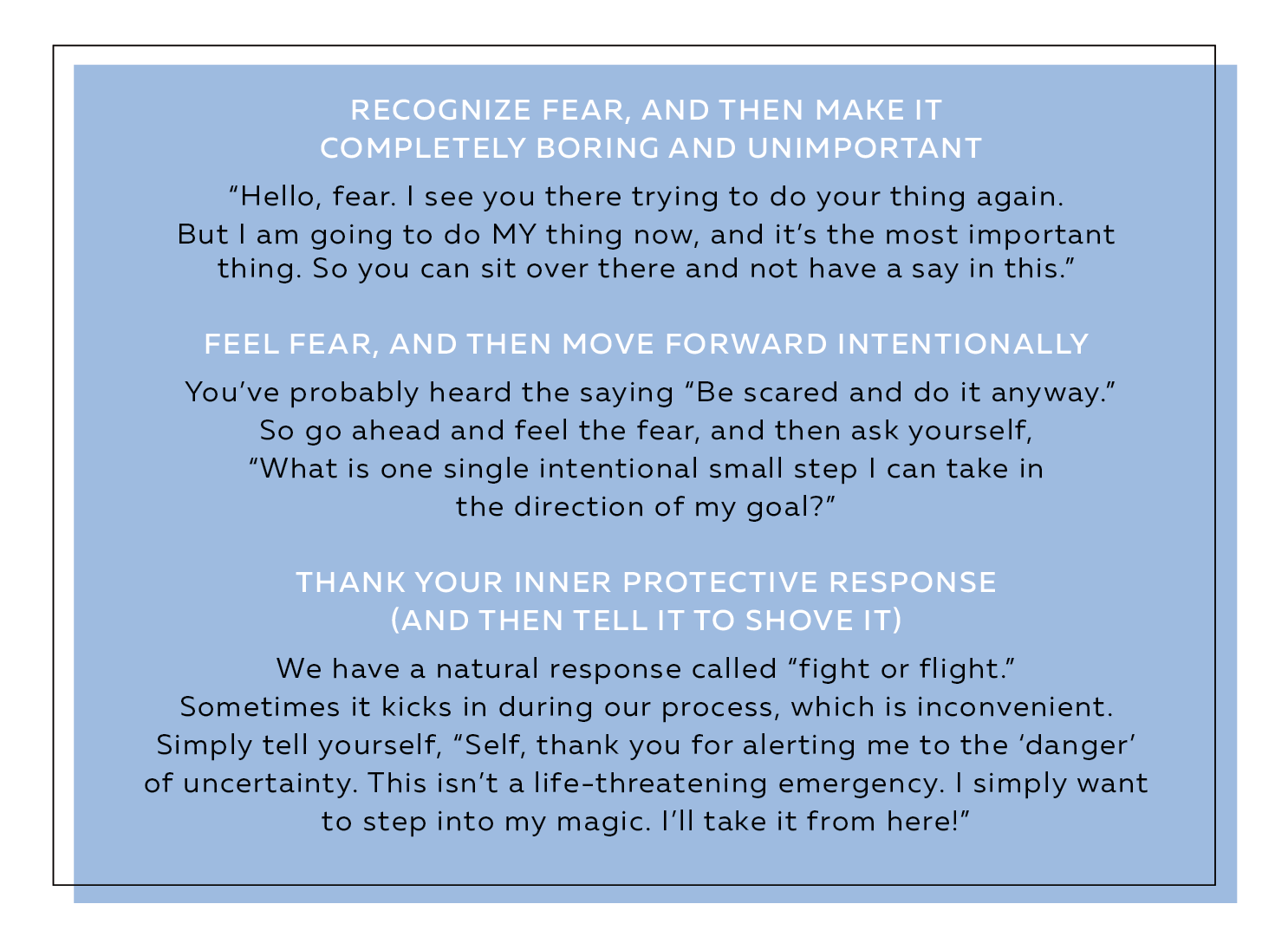Embracing Fear as a Writer
Fear shows up in many ways during the creative process. It can look like procrastination, doubt, self-sabotage, insecurity, or perfectionism and control (to name a few). We might not always feel “scared,” but fear holds us back more than we might realize.
Misconceptions about fear
Oftentimes, we think we have to conquer fear before we can be our authentic selves. Our true self wouldn’t let fear hold us back, would it? No, of course not! But the answer isn’t to eliminate fear completely. The secret is understanding that fear will ALWAYS be there. It’s actually an important part of the process!
Fear is not your enemy
The biggest problem with fear today is not fear itself. Instead, it’s the belief that we should never be afraid, or we should conquer fear, or be courageous and confident no matter what. On the contrary, courage and confidence are not the results of the absence of fear. They come from feeling the fear and pushing through anyway. Fear inevitably shows up when you start something new and audacious, or put yourself out there. But when it does, instead of letting fear take over or derail us completely, we can flip the narrative:
Fear is a normal part of the writing process.
It’s normal to fear writing. Fear is built into the writing process, and without it, we wouldn’t be able to write anything at all. At least anything worth reading. You cannot write your way around your fears, and you cannot avoid them. You cannot escape by not writing. What writers need is not an anesthetic to fear, but courage. Courage is not an absence of fear, it’s the ability to move forward despite your fears. All writers need courage, and there are ways you can build more of it.
Fear is your ally.
The first step is realizing that fear is your ally, not a deterrent. Fear is what will make your writing excellent. In his book The Courage to Write, Ralph Keyes identifies several fears common to all writers. He argues that these fears are natural and that we would be stupid to think anything else. Merely encountering them and recognizing them as universal is the first step to developing the courage to write.
Three common fears and how to handle them:
Fear #1: Can I really do this?
First of all…Well, yes, you can. Writers are good readers, so you have a sense of what is possible in writing, but you doubt your abilities—even if you have written before! This fear is so ingrained in us that it strikes before we even reach the blank page. Fear can keep us from even trying. We don’t even sit down and try to write. We avoid it entirely. We may not be able to “do” everything, but we can definitely do SOMETHING. So why not try?
Solution: To navigate this fear, try reading about successful writers and pay attention to their specific worries and how they dealt with them. Try and find copies of famous writers’ first drafts or their earlier works. Observe their modest beginnings and how it took them time to hone their skills. Realize that you are not alone in your fear and writer’s block. You won’t be amazing on your first try, and maybe not even on your twentieth or even your hundredth try. But the beauty of writing is that it’s never really finished. You can always revise it. You can always come back to it. You can always grow your skills. You just need to start and see where it takes you.
Fear #2: The blank page
All my life, I’ve been frightened at the moment I sit down to write.” –Gabriel García Márquez
Even when you feel ready to write and have the confidence and excitement to get started, the blank page still stares back in defiance. So how do you go from the thoughts in your head to words on paper?
Solution: Trust your instincts, try not to over-plan things. Step away from your work for a bit, separate your planning, writing, and editing phases into different days. See if you can avoid judging your work for at least a couple of days after writing it. Face that blank page every day. Ask yourself what type of routine or structure has worked for you in the past, and see if it could work again. And then ask, “What else might work?” And then give it a try.
To solidify your routine, create rituals and follow them regularly. Many writers had eccentric rituals that helped them ease their anxiety and get into the writing flow. Agatha Christie liked to eat fruit in the bath! Charles Dickens refused to sleep unless he was facing north. Vladimir Nabokov wrote all his novels on index cards. Develop your own routine, and if it works, stick with it, no matter how strange (no one has to know)!
Fear #3: Success and Publication
What happens when you finally finish your work? You banished the blank page, found some creative structure that works for you, and now you have a finished manuscript. Now what? Fear of rejection is now what. For a lot of writers, rejection is worse than no readers. If you aren’t rejected, then nobody but you can judge your work. If you do get rejected, you will have to look closely at your writing. You’ll have to confront your flaws and shortcomings. That scares a lot of writers, and rightfully so! It’s also very normal, and part of every writer’s path to publication.
Many writers stop at this step. They write, but they don’t publish, so nobody reads their writing. Fear of rejection is a big one. The high-stakes involved with publication is so daunting that far too many writers shove perfectly good writing in a desk drawer, never to be seen by anyone.
Solution: Submit your work. Submit. Your. Work. Even if you don’t feel ready. Even if it’s not "perfect.” I had a dream just last night that I submitted a manuscript after an unedited first draft. And I was so panicked in the dream that I woke up still panicking. When I was more awake and properly caffeinated, I realized that even a first round of edits is better than no edits. And what’s the worst that could happen, anyway? I’d get a generic refusal or some input to make it better. Either way, I am removing the wrong agents or publishers to make room for the right ones.
Submit enough work that you get used to rejection. As soon as you finish a writing project, start the next one immediately. Don’t wait to hear back, just keep your momentum going. It will help ease rejection. Your second piece of writing will almost certainly be better than the first, so when the first is rejected, you can say, “ I have something even better coming soon!” That way when you DO come back to a rejected first piece, you’ll have a more definite sense of why it was rejected and what you can do to improve it.
Writing is a perilous affair. It’s natural to be afraid. Good writing comes from leaning into that fear and creating something interesting for yourself AND your readers. To be interesting, you have to go out on a limb. You have to risk something. The greater the risk, the greater the reward. Creative inclination and fear go hand in hand, you can’t have one without the other. Just remember, when fear causes you sleepless nights and you’re tossing and turning, and you’re wishing it would just go away, it’s not your enemy.
Fear is the fuel to your creative fire.

